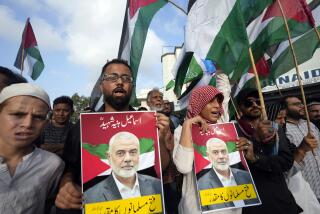Death of North Korea’s Kim Rattles G-7 : Diplomacy: Nuclear standoff with Pyongyang will dominate talks today.
- Share via
NAPLES, Italy — The death of North Korean leader Kim Il Sung sent a tremor of anxiety through the Naples meeting of the world’s leading industrial nations Saturday.
Leaders of the advanced nations sought to put the best face on developments since the death, but they privately acknowledged their deep concern about what many view as the world’s most dangerous trouble spot. And as they scrambled for scarce information, they said the death of the 82-year-old dictator would push the North Korean nuclear standoff to the top of political talks scheduled for today.
Although Kim’s death temporarily shut down talks between North Korea and the United States over Pyongyang’s nuclear program, President Clinton said he saw “good news” in the request of North Korean negotiators in Geneva that U.S. officials remain in Switzerland for talks that may resume after Kim’s funeral, in eight days.
The talks, which entered their third round Friday, are aimed at resolving a dispute over what U.S. officials fear may be North Korean use of radioactive power plant fuel for bomb-building.
“We believe that they will stay with their policy and stay with their course--that this reflects the feelings of the leadership in North Korea, and not simply the feelings of Kim Il Sung,” Clinton said.
He noted that U.S. military officials had decided against calling an alert for the 37,000 U.S. troops in South Korea after an inspection showed “there was no evident, alarming change.”
Yet Clinton stopped short of praising Kim’s heir apparent, Kim Jong Il, whom U.S. officials have in the past described as erratic, dissipated and dangerous.
“I know something about him, obviously, but I haven’t met him,” Clinton said tersely when asked his view on the likely North Korean ruler. The younger Kim has rarely been seen and has never met U.S. officials.
Other world leaders at the meeting interrupted their economic discussion to interrogate Clinton on how he plans to react to the developments.
“What they wanted to know from me was what happens now,” Clinton said. But he acknowledged that “we don’t have any more information.”
The summit brought together the leaders of the United States, Japan, Germany, France, Canada, Italy and Britain.
U.S. officials, clearly searching for hopeful signs in a murky situation, said they saw some evidence that a cadre of officials, perhaps led by Kim Jong Il, was taking charge. They said the fact that Kim’s death was not formally announced until 32 hours after it occurred suggested that a leadership group was deliberating over affairs of state.
U.S. officials went out of their way to try to quash speculation that the death might be the result of a coup, saying they had no evidence that the cause was anything other than a heart attack, as officially reported. They said there were no signs of ominous troop movements in North Korea.
Secretary of State Warren Christopher, who said he had been in talks on developments on the Korean peninsula since early Saturday, said U.S. officials will be “watching this with great care.”
And another U.S. official acknowledged that no matter what the United States might want to do about the succession, “we have exactly zero influence over this.”
Foreign ministers of Japan, South Korea and Britain were quick to assert their view that the death will not disturb the unstable chemistry of the region.
Japanese Foreign Minister Yohei Kono said he believes the situation will not “negatively disturb the situation on the peninsula.”
More to Read
Sign up for Essential California
The most important California stories and recommendations in your inbox every morning.
You may occasionally receive promotional content from the Los Angeles Times.














